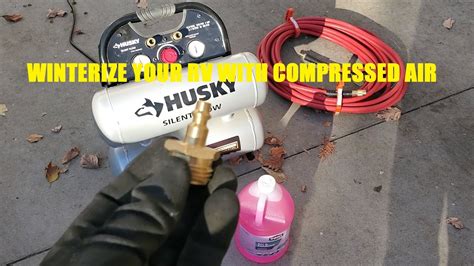How To Winterize A Camper With Compressed Air
Ronan Farrow
Apr 03, 2025 · 3 min read

Table of Contents
How to Winterize Your Camper with Compressed Air: A Complete Guide
Winterizing your camper is crucial to prevent costly damage from freezing temperatures. Using compressed air is a highly effective method, significantly reducing the risk of water damage to your plumbing system. This guide will walk you through the process step-by-step, ensuring your RV is ready for the cold season.
Preparing for the Winterization Process
Before you begin, gather your necessary materials. You'll need:
- Compressed air tank: Ensure it has enough capacity for your RV's plumbing system.
- Air compressor: If you don't own a tank, renting or borrowing an air compressor is fine.
- Blow gun: This helps direct the compressed air effectively.
- Low-pressure regulator: This is crucial to prevent damage to your pipes. Never use high-pressure air directly.
- RV antifreeze: While compressed air removes most water, a small amount of antifreeze in low points provides an extra layer of protection.
- Water hose: To flush out the system initially.
- Towels: For cleanup.
- Safety glasses: Protect your eyes from potential debris.
- Gloves: For protection and warmth.
Step-by-Step Winterization with Compressed Air
This guide is for general RV systems; always consult your RV's owner's manual for specific instructions.
1. Prepare Your Plumbing System
- Purge the System: Completely drain your fresh water tank. Open all faucets and low-point drains to ensure maximum water removal. Run your water pump to help expel any remaining water.
- Flush the Lines: Connect your water hose and flush the lines thoroughly to remove any sediment.
2. Connect the Compressed Air
- Attach the Regulator: Connect the regulator to your compressed air tank or compressor. This is vital to avoid damaging your plumbing system.
- Set the Pressure: Adjust the regulator to a safe, low pressure—typically around 30 PSI. Higher pressure can damage your pipes.
- Connect the Blow Gun: Attach the blow gun to the regulator.
3. Blow Out the Lines
- Start at the Highest Point: Begin at the highest point in your plumbing system (usually the water pump inlet). Insert the blow gun and gently introduce compressed air.
- Work Your Way Down: Move systematically to lower points, ensuring air flows freely through each pipe. Pay close attention to all faucets, showerheads, and low-point drains.
- Open and Close: As you blow out each line, open the faucet or drain to ensure all water is expelled. Then close it afterward.
4. Add Antifreeze (Optional but Recommended)
- Low-Point Protection: Even after compressed air, small amounts of water may remain in low points. Adding RV antifreeze to these areas provides an extra layer of protection against freezing. Pour a small amount of antifreeze into the low-point drains.
5. Final Checks
- Verify No Water Remains: Check all faucets and drains for any remaining water. If any remain, repeat the compressed air process.
- Inspect for Leaks: Carefully check all connections for leaks.
6. Winterize Other Components
Remember that winterizing your camper goes beyond just the plumbing. Consider these additional steps:
- Protect your water heater: Drain and flush your water heater completely.
- Winterize your toilet: Follow the instructions specific to your toilet model.
- Protect your refrigerator: If it's not a 12V model, take necessary steps to protect it from freezing temperatures.
- Insulate pipes: Consider additional insulation if you live in an extremely cold climate.
Tips for Success
- Patience is key: Take your time to thoroughly purge the system and ensure complete water removal.
- Regular Checks: If you're storing your camper for an extended period, perform periodic checks to ensure everything remains frozen-proof.
- Consult a Professional: If you're unsure about any aspect of the process, consult an RV professional.
By following these steps, you can confidently winterize your camper using compressed air, ensuring its longevity and protecting your investment throughout the winter months. Remember, safety first! Always prioritize your safety and the safety of your equipment.
Featured Posts
Also read the following articles
| Article Title | Date |
|---|---|
| Farrell Bags How To Use | Apr 03, 2025 |
| How Common Is Silicone Allergy | Apr 03, 2025 |
| P1df3 How To Fix | Apr 03, 2025 |
| Lucid Boost Vape How To Turn On | Apr 03, 2025 |
| 2 4mg Of Semaglutide Is How Many Units | Apr 03, 2025 |
Latest Posts
-
How Fast Is 18 Hp In Mph
Apr 04, 2025
-
How Fast Is 1600w 48v In Mph
Apr 04, 2025
-
How Fast Is 150 Hp In Mph
Apr 04, 2025
-
How Fast Is 119 Km In Mph
Apr 04, 2025
-
How Fast Does Xeomin Work
Apr 04, 2025
Thank you for visiting our website which covers about How To Winterize A Camper With Compressed Air . We hope the information provided has been useful to you. Feel free to contact us if you have any questions or need further assistance. See you next time and don't miss to bookmark.
